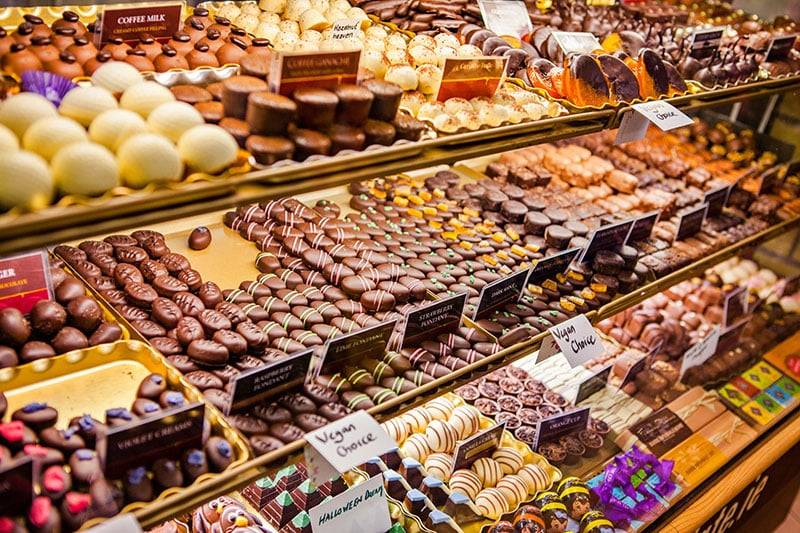The Swiss Chocolate Industry: A Source of Pride and Economic Success
Switzerland’s chocolate industry not only delights chocolate lovers but also contributes significantly to the country’s economy. With a strong domestic market and a thriving export industry, Swiss chocolate plays a vital role in driving economic growth.
Swiss consumers have the second highest per capita chocolate consumption in the world, surpassing even chocolate-loving nations such as Germany. This robust domestic market, combined with Switzerland’s reputation as a producer of premium chocolates, has helped the country establish itself as a leading player in the global chocolate industry.
The Birth of Swiss Chocolate: Innovations that Shaped the Industry
The triumph of the Swiss chocolate industry is rooted in groundbreaking innovation. In the 19th century, Swiss chocolatiers were at the forefront of mechanised chocolate production, a key revolution in manufacturing.
Visionary entrepreneur François Louis Cailler ignited this journey by launching the first mechanised chocolate production facility in 1819. His automation advances streamlined processes, increasing efficiency and accessibility while lowering costs. In 1826, Philippe Suchard entered the scene with a groundbreaking cocoa powder and sugar mixing machine. This innovation catalysed the mass production of chocolate, reducing costs and increasing efficiency.
Wealth Aggregation: Simple, Dynamic, and Secure Beyond Compare. Discover the Altoo Wealth Platform!
In 1875, Daniel Peter, connected to Cailler through marriage, ushered in the era of milk chocolate. Combining cocoa with Henri Nestle’s condensed milk, this invention not only tempered bitterness but also harnessed nutrition and economy. Rodolphe Lindt’s conching process in 1879 redefined chocolate excellence. Extended grinding and blending produced a smooth, melting chocolate that set an unprecedented quality standard. This triumph gave birth to the world’s first melt-in-the-mouth chocolate, delighting connoisseurs everywhere.
The Global Reach of Swiss Chocolate
The annual turnover of chocolate production in Switzerland is about $1.5 billion. The Swiss produce approximately 180,000 tonnes of chocolate per year. The country’s chocolate exports have been growing steadily, with key markets including Germany, France, Canada, and the United Kingdom. Swiss chocolate brands such as Lindt & Sprungli and Chocolat Frey have established a global presence, with production facilities in Europe and the U.S. and distribution networks that span the continents.
The Future of Swiss Chocolate: A Sweet Journey Ahead
The Swiss chocolate industry is poised for continued growth and success in the coming years. The global market size of the Swiss chocolate industry is projected to reach $2.11 billion by 2029, with a compound annual growth rate (CAGR) of 3.28% from 2023 to 2030. This growth is driven by increasing awareness of the health benefits of high-quality chocolate as well as the demand for specialty chocolates that cater to specific dietary preferences.

Trends and Opportunities in the Swiss Chocolate Market
As consumer preferences evolve, the Swiss chocolate industry is adapting to new trends and opportunities. Swiss consumers are increasingly demanding high-quality, premium chocolate products. In particular, dark chocolate has become increasingly popular, with 66% of chocolate consumers in French-speaking Switzerland preferring dark chocolate. By contrast, milk chocolate remains the preferred choice for 70% of consumers in German-speaking Switzerland.
The premiumization of chocolate products is evident in different market segments. Retailers such as Coop and Migros offer organic and Fairtrade-certified chocolate under their private label brands. Major chocolate manufacturers such as Lindt & Sprungli have also introduced innovative products such as high-cocoa chocolates and new snacking formats to meet the demand for premium options.
Swiss consumers’ focus on sustainability is another opportunity for the chocolate industry. Switzerland has established the Swiss Platform for Sustainable Cocoa with the goal of sourcing at least 80% of cocoa sustainably by 2025. The demand for organic and Fairtrade-certified cocoa is also significant in the Swiss market, which has the highest per capita consumption of organic and Fairtrade products in the world. Chocolate companies such as Durig Chocolatier Lausanne, Stella Bernrain, and Pronatec produce fair trade and organic chocolates to meet consumer preferences.
Major Swiss Chocolate Manufacturers
Barry Callebaut Group: Since its founding in 1850, the Barry Callebaut Group has been shaping the global chocolate and cocoa industries. It operates in more than 30 countries and serves customers in more than 150 countries, with a reputation for innovation and sustainability. It specialises in a wide variety of chocolate products made from cocoa beans and serves manufacturers and chocolatiers. Its artisanal focus and commitment to responsible cocoa sourcing have earned it industry recognition. With annual sales of approximately $8.9 billion, the Zurich-based group is the leading manufacturer of high-quality chocolate and cocoa products.
Lindt & Sprüngli: Founded in 1845, Lindt & Sprüngli is a renowned Swiss chocolate brand synonymous with excellence. Committed to Swiss craftsmanship and the finest ingredients, the company has a global presence and a diverse portfolio to meet a wide range of tastes. Effective marketing further enhances its brand, while its financial strength is evident, with global sales of approximately $5.47 billion in 2022. It particularly shines in key markets such as France, with 2022 sales of $449 million, highlighting its broad appeal and strong performance.
Chocolat Frey: With a rich history dating back to 1887, Chocolat Frey is a respected Swiss chocolate manufacturer specialising in high-quality products. Based in Buchs, Switzerland, the company exports its treats to more than 50 countries. Their exceptional chocolate, made by skilled chocolatiers in modern facilities, prioritises quality and innovation. Sustainability is an integral part of their values, with responsible sourcing of cocoa beans and a commitment to environmentally friendly production. In the most recent annual report available, Chocolat Frey achieved annual sales of $455 million, demonstrating their robust global presence and popularity.

















